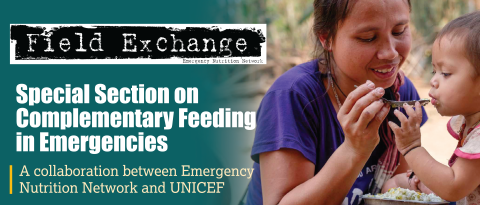Ukraine crisis: Organisational guidance for the feeding of children aged six months to two years
This is a summary of the following report: IFE Core Group, Global Nutrition Cluster, UNICEF & World Food Programme (2022) Guidance for organizations supporting the feeding of children aged 6-months to 2-years in the context of the Ukraine crisis. https://reliefweb.int/report/ukraine/guidance-organizations-supporting-feeding-children-aged-6-months-2-years-context-ukraine-crisis-may-2022
In May 2022, the Infant Feeding in Emergencies Core Group, the Global Nutrition Cluster, UNICEF, and the World Food Programme issued joint guidance for organisations supporting the feeding of children aged 6-24 months. The guidance was issued to reinforce the notion that the complementary feeding period remains critical for child development as the 6-month mark represents a time when child energy and nutrient needs begin to exceed that which can be provided by breast milk alone. For adequate complementary feeding, a diverse array of foods in appropriate quantities is required. In Ukraine, access to these specific foods is likely to be disrupted due to market impacts, shop closures, and reduced means to both purchase and prepare foods.
The guidance highlights that organisations should consider contextual factors when providing food assistance, namely the safe availability of nutrient-rich foods in the market, the cultural appropriateness and acceptability for the age group, access to fuel, equipment, utensils and facilities to prepare and offer food to young children, access to clean water for both drinking and food preparation, a clean environment, for hygienic food storage and preparation, and mobility, specifically whether families are stationary or in transit due to the evolving security situation.
The guidance also details what to include in a food assistance package and how much food to provide, calculated based on the energy and nutrient requirements for young children. In addition, it highlights what support activities, services, and supplies can be provided to ensure the beneficiaries are well informed and able to access any additional practical support needed.
The document also outlines five key items that should not be provided in emergencies – foods in feeding bottles due to possible hygiene risks, foods that may cause choking hazards such as whole nuts, powder milk or infant formula as widespread use undermines the uptake of breastfeeding which is the optimal feeding strategy for this age group, foods labelled for children less than six months of age as they may be nutritionally inadequate, and foods and drinks that have a low nutrient value such as high salt soups, noodles, deep fried foods, salty snack foods, cakes, sweets, sugar-sweetened beverages, sweetened fruit puree, or sweetened breakfast cereals.


